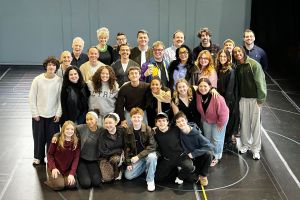Mick Gordon On … Emotion & Michael Coveney
Mick Gordon is an award-winning director who is a former artistic director of the Gate and associate director of the National Theatre. He is the founding artistic director of On Theatre, whose latest production, or “theatre essay”, On Emotion, is currently running at Soho Theatre. He responds to Whatsonstage.com chief critic Michael Coveney’s review of the production.
My most experimental theatrical work is produced by my company, On Theatre. It’s On Theatre because every 18 months it produces a piece of theatre On a given subject. We call our pieces Theatre Essays, a phrase which neatly describes our theatre-making process. As with a written essay, the starting point for a Theatre Essay is a theme and a question. And finding the most theatrically vibrant question to ask of our theme informs the making of our work. On Theatre then uses the tools of the theatrical trade – character, narrative, image, metaphor – to answer the question as theatrically as possible. But we are unapologetically idea-led and what we don’t do is try to make a recognisable play.
In a previous Theatre Essay, On Ego, I worked with the neurologist Paul Broks to ask: How does the brain create a sense of self? In On Emotion, we have continued our creative partnership in order to deconstruct the architecture of those things that preoccupy us the most in life, and constitute the theatre’s most vital tool: our feelings.
It is generally agreed that there are six basic emotions: fear, sadness, anger, surprise, joy and disgust. We share these basic emotions with the great apes and other mammals. And yet they are central to our human experience. They make us what we are. They give our lives meaning; make life worth living, or perhaps ending. They raise us to the pinnacle of spiritual and artistic experience. They do all of this. And yet, they often seem to be beyond our control. But is this true?
Investigating emotion’s relationship to thought would be fundamental. So we started with the question: Are we pulled and pushed by forces we can’t control? Moved to: Is rational thought like so much steam from a kettle, secondary to the heat? Got lost in: Are we simply the dupes of nature’s cruel joke; the illusion of free will? And finally arrived at: Are we just the puppets of our emotions? And this question led us to the puppeteers Blind Summit and the central metaphor of puppetry which dominates the performance.
Critics of our work fall into two camps. And the interesting thing is this: whether they like our work or not is not the differentiating issue. The issue which divides our critics is whether or not they accept the central premise of a Theatre Essay. Whatsonstage.com critic Michael Coveney did not. He thought that On Theatre sacrificed character and narrative to the exploration of the idea. We did. And we do it deliberately, consciously revealing the nuts and bolts of theatre to serve the exploration of the theme. And he thought that we were being dramatically provocative having a character comically masturbate on stage. We were. And we are being deliberatively provocative as the emotion we spend most time exploring in the piece is: disgust.
Underlying Michael Coveney’s criticism is a creatively stultifying decision about what a piece of theatre must be. “It must be a play…” “It must be narratively driven…” “It must integrate its provocative moments…” And people who have made such a decision are never going to evaluate this type of work on its own terms. On Theatre makes idea-led theatre and what we don’t do is try to make plays. Our work is bold, innovative and celebrates the countless possibilities of theatre. Because even though we have been making theatre for 15 years, unlike Michael Coveney, we refuse to decide that the theatre must be only one thing.
On Emotion opened on 12 November 2008 (previews from 5 November) at Soho Theatre, where it continues until 20 December 2008.












